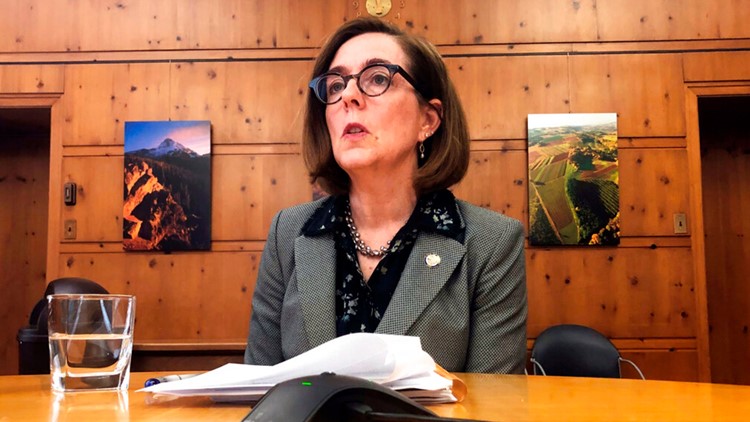PORTLAND, Ore. — Oregon's clean energy bill, which sets one of the most ambitious timelines in the country for moving to 100% clean electricity sources, was signed by Gov. Kate Brown on Tuesday.
The legislation lays out a timetable for the state’s two major power companies — Portland General Electric and Pacific Power — to reduce greenhouse gas emissions associated with electricity sold to Oregon consumers. Additionally, it bans the expansion or new construction of power plants that burn fossil fuels and allocates $50 million in grants for community-based energy projects, among other measures.
“With these policies, we will create jobs in a 21st Century, clean energy economy," Brown said. “We will reduce carbon emissions. And, we will make sure the economic, environmental and health benefits of our clean energy economy reach all Oregonians, especially those who have been disproportionately impacted by climate change and pollution."
The bill requires Portland General Electric and Pacific Power to submit plans to reduce emissions by 80% from a baseline amount by 2030, 90% by 2035 and 100% by 2040.
Dave Robertson, vice president of Public Affairs at Portland General Electric, says the timeline is an “important step toward the clean energy future”.
“It provides a clear path for this critical transition while protecting the affordability and reliability of electricity, and it establishes greenhouse gas reduction targets that are in line with the climate goals we set for ourselves late last year,” Robertson said.
At least 17 other states and the District of Columbia have already adopted similar goals, according to the Clean Energy States Alliance.
But officials say Oregon's timeline is the “strongest electricity emissions reduction timeline in the country”. The deadline is nearer than nearly every other state that has adopted a clean power plan, including Washington and California.
Oregon would measure its progress in an atypical way, too.
Most states have opted to ratchet down greenhouse gas emissions by requiring utilities to gradually increase the amount of power they get from renewable energy sources like wind and solar. Oregon, which has already had such a “renewable portfolio standard” since 2007, is taking a more straightforward approach: requiring Portland General Electric and Pacific Power to reduce their overall carbon emissions, which are tracked by the state’s Department of Environmental Quality.
“Already, we are seeing the devastating impacts of climate change, from more frequent drought to more severe wildfire seasons that put our homes and our families in jeopardy,” said Rep. Jason Kropf, a sponsor of the bill and a Bend Democrat. "This bill will put Oregon on a pathway for a more environmentally sound future and create economic opportunity and jobs for our working families.”
Environmental activists have called the bill's passage a huge victory, especially as the state and country continue to see the worsening effects of climate change. But the bill, which passed in Oregon's Senate 16-12 and in the House 35-20, has also been criticized.
“Hiking Oregonians’ energy costs during an economic recovery is one of the dumbest ideas I have ever heard of,” said Senate Republican Leader Fred Girod. “This bill just adds insult to injury to the countless Oregonians who have endured massive hardship over the last year and a half.”
Opponents of the bill say the policy will increase electric prices for Oregonians, cause business energy costs to skyrocket and put strain on the power grid — possibly leading to rolling blackouts.
“This bill accomplishes nothing for our environment,” Girod said. “It is simply a bill to virtue signal to extreme environmentalist groups that will cause Oregonians to pay more for less reliable energy.”
Whether or not the timeline is attainable is also uncertain.
“If you go out to 2030, we think we can hit that,” PacifiCorp Senior Vice President Scott Bolton told The Oregonian/Oregon Live last month. “We were pretty clear though, beyond that we don’t have a plan that shows we can get there.”
Likewise, Brett Sims, a vice president at Portland General Electric, told The Oregonian the company can meet the 2030 target by eliminating coal, operating its natural gas fired plants to serve peaks rather than base load demand, and adding substantial wind, solar, storage and demand reduction strategies to its resource mix. However, the 2040 target, he said, remains aspirational.



